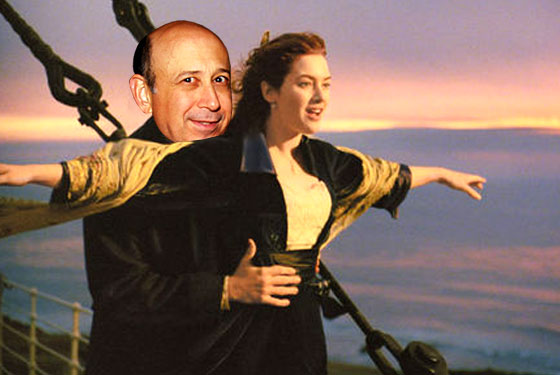Why investment bankers should be heading for the lifeboats
April 17th, 2010
Wall Street and City firms once saw their primary roles as being to serve clients and ensure the more efficient allocation of capital. Or so I am told. But that all changed with the death of the partnership model and ‘Big Bang’ in the 1980s.
Both Wall Street and the City were transformed — as was the profitability of “bulge bracket” investment banks such as Goldman Sachs. As the firms shed their partnership status, acquired niche players and stretched their tentacles into every corner of financial markets, it didn’t take long before they lost any scruples about exploiting conflicts of interest in order to enrich themselves at their clients’ expense.
Both Wall Street and the City became peopled by a new breed of investment banker. These were amoral and rapacious types perhaps typified by the ex-Merrill Lynch head of financial institutions group, Matthew Greenburgh. He earned a $20m bonus for pulling off RBS’s utterly brilliant €72bn acquisition of ABN Amro and presumably a similar sum for handling Lloyds TSB’s supremely value generative purchase of HBOS in September 2008. And I have been assured by those who know him well that Matthew’s nickname, ‘ELF’, does not stand for ‘Erudite, Likeable Fellow’.
It’s increasingly clear that such investment bankers were not motivated or influenced by anything remotely resembling ethics or even their clients’ interests. No. As the fallout from the crisis unfolds with astonishing revelations about the way Goldman Sachs designed so-called “gold-plated turds” in order to enrich the few and impoverish the many, that they are a breed apart, sociopathic and entirely motivated by the opportunities an very lightly regulated financial market offers for stupendous self-enrichment.
As long as they made money for their own firms and earned obscene bonuses, they don’t appear to have cared whether their clients were “shafted” along the way, that their firms had become parasitical on the “real” economy and society at large or that their boats were so over-leveraged they were incapable of surviving even a vaguely choppy sea without massive government support.
Governments on both sides of the Atlantic were complicit in the creation of these monsters; indeed they fuelled their success with a near regulatory vacuum accentuated by the deregulation of derivatives and President Bill Clinton’s repeal of the Glass-Steagall Act in 1999.
However it does appear that the mood music in Westminster and Washington DC is changing, largely as a result of the bankers’ ingratitude, lack of contrition and apparent inability to reform themselves post the global financial crisis that they caused.
This change of mood is evidenced by FSA chairman Lord Turner’s remarks about the “social uselessness” of investment bankers (which appeared in the pages of Prospect Magazine August’s 2009 issue) and more recently by the SEC’s decision to press charges on Goldman Sachs for allegedly defrauding its own “clients” through the creation of hideously complex synthetic CDOs. The investment bank is currently employing a lot of bluster and “angels dancing on the head of a pin” type arguments in a doomed attempt to justify its behaviour and pretend it has done nothing wrong. However to me at least it seems cornered.
To get an idea of what prospectuses for these CDOs look like, click here. This one is for another Goldman Sachs-created CDO, Anderson Mezzanine Funding 2007-1, but the prospectus for Abacus 2007 was doubtless fairly similar. Talk about trying to disguise risk — and the truth — in a jungle of opaque legalese and verbiage!
Complacent investment bankers who engage in deliberate attempts to fleece their own clients or cook their bank’s books may still be able to rely on the connivance and complicity of the “Big Four” auditors but, luckily, these self-serving charlatans seem to be about their only friends left.
Regulators and government are losing patience with mendacious bankers and will be less predisposed to give Goldman Sachs chief executive Lloyd Blankfein (pictured above on the prow of RMS Titanic with Kate Winslet) the time of day.
“Big swinging dicks” such as the “Fabulous” Fabrice Tourre, who gave the game away about Goldman’s Abacus-related web of deceit through his injudicious emails — and indeed many of the employees of investment banks around the world — are, hopefully, drinking in the last chance saloon.
If they are not prepared to mend their ways, then they can be pretty sure that governments – or their clients – will step in and do it for them.
Further reading:-
- It was not lack of regulation but lack of ethics that killed the Street
- Goldman’s reputational issues are more than skin deep
Short URL: https://www.ianfraser.org/?p=1059

